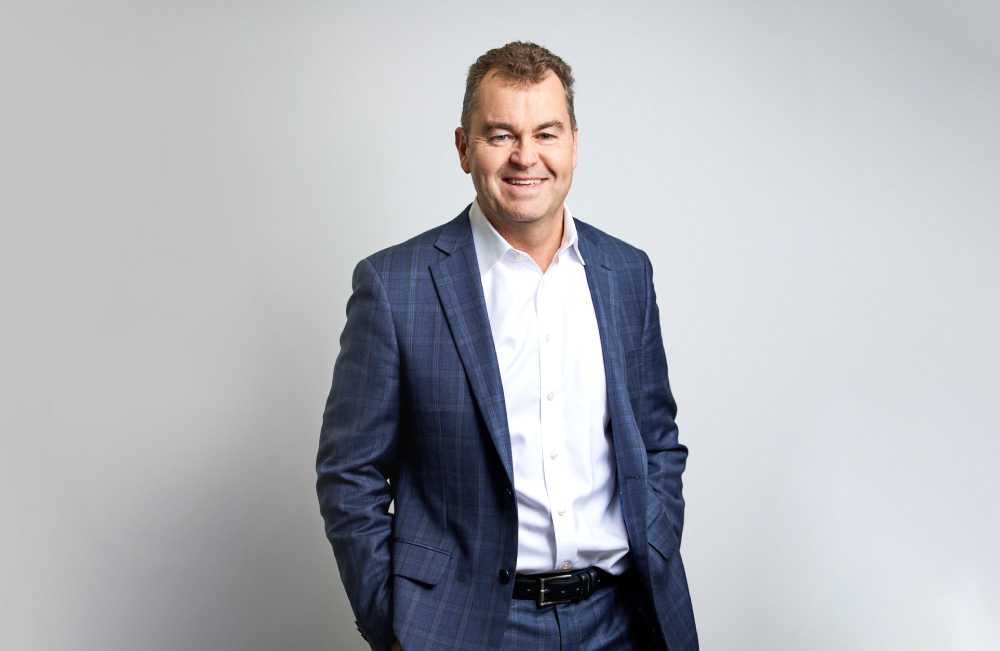
02 Dec Q&A with Shane: The story behind BellchambersBarrett
BellchambersBarrett is a firm that’s known for its strong community spirit and supportive work culture. And these values have been present since day one.
To understand how and why BellchambersBarrett came to be, we sat down with Shane Bellchambers: one half of the duo who founded a professional services firm that puts compassion first.
Hi, Shane – thanks for chatting today. To kick things off, what were you up to career-wise before founding BellchambersBarrett?
My first job was pool attendant at AIS. I was fresh out of high school, and a year into that job I thought to myself, ‘There’s no way I’m doing this for the rest of my life.’
So I enrolled at university in 1986 and then began my career in accounting.
In 1989, I joined a Big Four accounting firm where I worked for about four years. Then I moved to a small firm in Canberra in 1993, called WalterTurnbull (WT), which only had seven staff members at that time.
While I was there, the firm grew to over 300 people, and I became a partner in 2000.
Then in 2010, WT was acquired by PwC – and I was appointed as partner on the acquisition.
That’s quite a tale. So how did BellchambersBarrett come about?
Well, after three years at PwC, I began to miss working in a smaller team environment. I didn’t enjoy the culture. As the saying goes, it felt like we were all just cogs in a machine.
That realisation, along with my wife at the time falling ill, shifted things for me. I started to think about what I really wanted out of my life and my career. And I knew it wasn’t to work in a firm that felt mechanical.
So I decided to take the plunge – and set up my own firm.
I started the planning process in 2013, which was daunting but very exciting. I spoke to a few people who had worked for me over the years and gathered a team of five who were also very keen to move to a smaller firm.
What else excited you about the chance to build your own firm?
There were many reasons I wanted to start BellchambersBarrett.
At the top of that list was the culture of a smaller team. That really appealed to me. I wanted to create a workplace that would make me want to come to work every day.
I was also motivated by the chance to control my own destiny. And to see the rewards of my work relate directly to the effort I put in.
There were personal reasons as well. My wife was ill at that time, and I really wanted to be able to be there for her when she needed me.
My friend, James Barrett, shared my dream of starting up a firm, and we’d always worked well together. So I pitched the idea to him, and he jumped at it.
James and I have led the team at BellchambersBarrett ever since.
Start-ups are never easy. What challenges did you face when starting the firm? And how did you overcome them?
There were many challenges – and there still are.
I’ve learned that overcoming obstacles is all about being well prepared and having solid plans in place for what you want to achieve.
But planning is just the first step. It’s also important to have actions and tasks related to every single part of the plan to make sure you stay on track.
In the early days, our challenges were finding staff who wanted to get on board with our dream – and convincing clients that they would get a better, more personal service with us.
Setting up the office, and managing all the admin that goes with running a firm, was also challenging. But I believe it all comes back to planning and strategy – and specific tasks to help achieve your goals.
What are your standout memories and experiences since starting BellchambersBarrett?
I have so many.
For the first three or four months, we held all our staff meetings at my dining room table. I have fond memories of those times.
I also remember walking into our first office in Braddon. That was both exciting and scary. We had five staff and an office that could fit 14… Would we ever fill it up?
Winning our first major government client – that was a momentous day.
And, of course, watching my staff who’ve worked with me for the last 10 to 15 years become partners in our firm. Seeing the grads that we employed six or seven years ago evolve into outstanding professionals. And moving into a larger office in 2017.
We are now a team of over 50 people. It’s been such an amazing journey.
What is your favourite thing about your work now?
The people. They motivate me most of all.
Our tremendous group of staff come from diverse backgrounds – yet everyone gels so well. We genuinely care for each other, and we strive to have zero office politics.
That certainly sounds like a great aim. How do you maintain your team culture and keep everyone so close?
We know people are our assets, and we really protect our team culture.
If someone comes on board and they’re not a team player or they don’t fit in our values, they usually wouldn’t make it past the probation period.
We also have a very active social club that’s run by our staff. They hold events and functions throughout the year.
I believe we have an outstanding work culture, evidenced by our very low staff turnover. That might be due to our strong values. We really champion them.
And how does this set BellchambersBarrett apart from other professional services firms?
We try to put people at the forefront of everything we do. We really value a client-centred approach, but we extend that to each other as well.
Internally, we treat each other as equals – everyone is the same, no matter what their level of experience.
We have fun in the office, and we strongly encourage a healthy work-life balance.
Work is important. But it shouldn’t be anyone’s entire life.
What are BellchambersBarrett’s top three values?
One: Respect your peers. We’re all part of the same team. Seniority levels are only there so that we can perform work professionally for our clients. No one is better than anyone else.
Two: Work hard while you’re at work. But it’s important to have work-life balance. We don’t expect staff to do significant overtime, which is unfortunately commonplace in our industry.
Three: Treat your clients respectfully – like you would your friends. Work hard for them. And give them a personal experience.
Giving back to the community seems to be a big thing with BellchambersBarrett too. Why this is so important to you?
We are very lucky living in Canberra, and what we have achieved as a business has put us in a privileged position.
I believe we all – and I’m not just talking about BellchambersBarrett – have a responsibility to help those in need in our community.
This is an important part of our annual planning every year, where we decide how we distribute our resources in the community. This varies from sponsorships, to donations, to pro bono work.
But most importantly, we encourage all our staff to get involved in organisations where their skillsets can be of use. Many of them are involved as board members, and they do a significant amount of volunteer work.
What’s next for BellchambersBarrett?
My vision has always been to grow the firm at a pace that gives anyone coming through an opportunity to progress according to their professional ability and talent.
This means we have to continually look for growth opportunities, and diversify in some of the key services that we deliver.
Over the next five years, we will be looking to expand our IT and government consulting. I can see that, conservatively, we could be at roughly 80 staff with more than 10 equity partners.
From five people in 2014 to 80 in about 10 years would be a fantastic achievement for our firm.
And where do you see yourself in five years?
In five years’ time I will be very close to 60.
My goal in the coming three years is to be able to hand off to some of the promising and talented young people that we have coming though the firm.
If I can give them the opportunity to achieve what they want in their careers, I believe that I will have done what I set out to do.
And I’ll support the firm in whatever capacity for the foreseeable future.
Any words of advice for young professionals entering the workforce?
Find a place to work where you are comfortable and where you like the people you work with.
You spend a significant portion of your life working, and being around people that make you happy is key.
From that place, your career will take you wherever you want it to.




